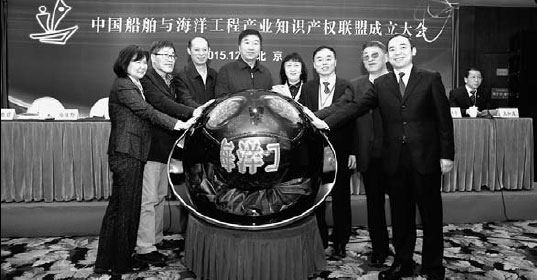|

Government officials, corporate executives, trade association leaders and a university representative mark the founding of the China Shipbuilding and Marine Engineering Industry Intellectual Property Alliance in Beijing on Friday. Wu Qiang / For China Daily
|
The China Shipbuilding and Marine Engineering Industry Intellectual Property Alliance was founded in Beijing last week to promote IP creation, use, management and protection throughout the sector, founders said.
The industrial alliance aims to provide a new platform to address the thorny issue of how to turn the sector from a large IP filer to a strong innovation powerhouse, Wang Zili, president of Jiangsu University of Science and Technology, said at a news conference on Friday.
The university, which evolved from the East China Shipbuilding Institute, is famed as the cradle of Chinese shipbuilding engineers, Chinese media has reported. It proposed founding the organization in September to sharpen the competitive edge of the industry, according to the university.
The alliance "will go all out to build up core patents, well-known brands and competitive copyrighted designs in the industry", Wang said.
Shipbuilding and marine engineering is a comprehensive industry that provides technology and equipment for shipping, maritime development and sea defense, he said.
One of the 10 priority sectors listed in the Made-in-China 2025 strategy, it is "of strategic significance" to the Belt and Road Initiative, Wang said.
While the global shipbuilding industry is experiencing a new round of adjustments, China's shipbuilding and marine engineering businesses are in a key stage of accelerating industrial restructuring and transformation, the university president said.
Only with core proprietary technology prowess can domestic shipbuilders stand out in the increasingly fierce and complicated international competition, he said.
More than 50 large Chinese shipbuilders, trade associations, key research institutes and universities involved in the sector, and IP service providers co-founded the alliance.
The big names include Dalian Shipbuilding Industry, Jiangnan Shipyard (Group), Shanghai Waigaoqiao Shipbuilding, and the research institutes of China Shipbuilding Industry Corp and China State Shipbuilding Corp, as well as the Ocean University of China, Harbin Engineering University and Shanghai Jiaotong University.
According to its charter, the alliance is designed to promote the integration of IP and the industry, conduct research into industrial standards and develop a mechanism to deal with common IP disputes.
Lu Xi, deputy director of the technology department of the Ministry of Industry and Information Technology, told the meeting that as a leading-edge technology-intensive sector, shipbuilding is a direct reflection of a country's advanced manufacturing capability and level.
China held 40.96 million compensated gross tonnage of new shipbuilding orders as of June, the most of all shipbuilding countries, according to British research agency Clarkson Research Services.
While the country has topped the world in terms of shipbuilding capabilities, there is still a considerable difference with advanced countries in core technologies in high-tech vehicles and high-end offshore engineering, Lu said.
Many domestic shipbuilders have to pay heavily to use foreign patents, which indicates that they need to increase efforts in improving their own technology expertise and innovation, he said.
The alliance creates an effective path for coordinated use and development of IP and dealing with IP risks.
Jin Jianjiang, director of Science and Technology Development Department of Jiangnan Shipyard, said patent license fees account for approximately 5 percent of production costs.
Yet the price of IP risks is much higher.
"After a patent purchase, you may only find it useless due to misleading information or even fraud," Jin said.
"In some cases, the key patent that we are seeking is buried in many others. Facing such a situation, we may be misled in research on our competitors' R&D focus and developments," he said.
The alliance will help its members position themselves better when dealing with such IP risks, Jin added.
Lei Xiaoyun, director of the patent administration department of the State Intellectual Property Office, said at the meeting that the interests of various parties are the key to market operations.
She called for increased cooperation between universities, research institutes and the industry and encouraged the alliance to innovate its operation mode, which will enable the sharing of resources, risks and benefits.
Wang Ying contributed to this story.
wangxin@chinadaily.com.cn
This page is jointly published by the State Intellectual Property Office and China Daily.
To comment or contribute, please e-mail ipr@chinadaily.com.cn or contact editors at+86-10-6499 5774.
